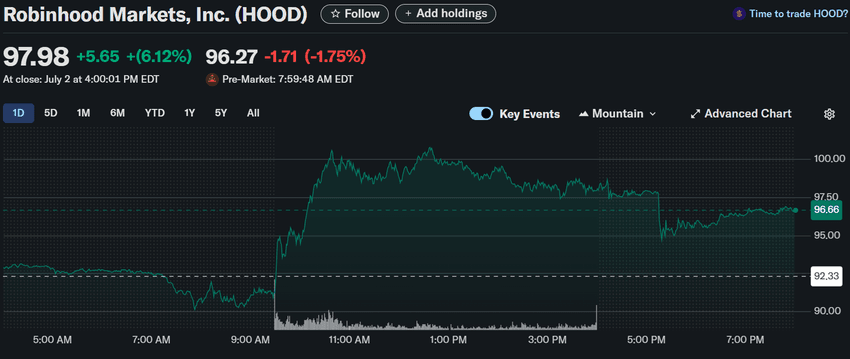Robinhood’s Tokenized OpenAI Move Ignites Controversy
Robinhood (HOOD) triggered waves across both the crypto and equity markets after launching blockchain-based tokens tied to private company equity, including OpenAI. On July 2, shares of Robinhood surged 6.12%, closing at $97.98, before dropping 1.33% after hours as backlash set in. The excitement was short-lived - OpenAI immediately rejected the offering, disowning any link to the token launch.
In a public statement, OpenAI clarified that it had no partnership with Robinhood and did not authorize any equity transfers. It further warned that these tokens were not recognized shares and urged users not to mistake them for genuine ownership in the company. The denial cast immediate doubt on Robinhood’s legal and operational framework behind the offering.

What Are These “Tokens” and Why Are They Causing Trouble?
Robinhood’s tokenized products, launched for European users, are blockchain-based contracts tied to special purpose vehicles (SPVs) that allegedly hold equity in private firms like OpenAI. But as critics pointed out, exposure via SPVs doesn’t guarantee true equity rights. There’s risk that private companies may invalidate such transactions if they breach shareholder agreements.
Despite the uproar, Robinhood defended the move, insisting the tokens are not shares themselves, but instead track the price of private equity stakes. CEO Vlad Tenev touted the launch as part of a vision to democratize access to high-growth private markets through tokenization. He said on social media:
The company described the release as a “limited giveaway” to educate users about tokenized assets—though many questioned the timing and structure.
Legal Questions Swirl Around Transparency and Ownership
So far, Robinhood hasn’t disclosed which SPVs were used or how it acquired the underlying equity in OpenAI. There’s also no clarity on the legal binding between token prices and real equity valuations, a gap that raises red flags for both investors and regulators.
Legal analysts warned that such unapproved asset exposure could trigger regulatory scrutiny and potentially lawsuits. The move rekindled long-standing concerns about tokenizing private equity without issuer consent, a challenge that has plagued similar efforts in the crypto-fintech space.
These “OpenAI tokens” are not OpenAI equity. We did not partner with Robinhood, were not involved in this, and do not endorse it. Any transfer of OpenAI equity requires our approval—we did not approve any transfer.
— OpenAI Newsroom (@OpenAINewsroom) July 2, 2025
Please be careful.
These “OpenAI tokens” are not OpenAI equity. We did not partner with Robinhood, were not involved in this, and do not endorse it. Any transfer of OpenAI equity requires our approval—we did not approve any transfer.
— OpenAI Newsroom (@OpenAINewsroom) July 2, 2025
Please be careful.
Markets React as Stock Rallies, Then Retreats
Despite the OpenAI fallout, the market initially cheered the token launch. Robinhood stock hit a new all-time high, driven by optimism around innovative blockchain financial products. Analysts say the surge came from excitement over exclusive equity access, even as legal tensions intensified in the background.
After-hours trading, however, showed signs of investor caution, as OpenAI’s rebuttal gained traction. Robinhood now faces the test of proving its model is viable - or risking a regulatory clampdown that could stall its expansion into tokenized private assets.
The Bigger Picture: Tokenization vs. Trust
Robinhood’s bold foray into tokenized equity markets is both ambitious and risky. Without formal backing from companies like OpenAI, platforms offering “synthetic” share exposure walk a fine line between innovation and legal overreach.
As more brokers race to tokenize access to private markets, the Robinhood–OpenAI clash could become a cautionary case study. If the firm hopes to lead the space, it may need to secure transparent structures, regulatory clarity, and, most importantly, cooperation from the issuers themselves.



